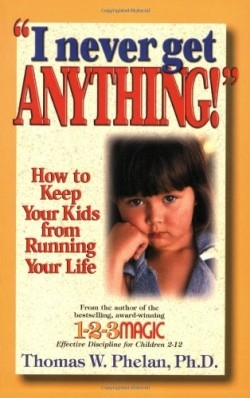"I Never Get Anything!" How to Keep Your Kids from Running Your Life
If a child’s role in life is to test parents, what should parents do about it? If that testing takes the form of tantrums and blatant disobedience, how can a parent regain control? The author takes on these tough challenges and more in this new parenting guide.
Phelan, a clinical psychologist and expert on child discipline and Attention Deficit Disorder, is no stranger to child discipline issues. In his latest book he clearly defines the different forms of childhood testing-badgering, temper, threats, martyrdom, buttering up, and physical tactics-and any or all in combination. Using examples from classes and counseling sessions (all anonymous), he thoroughly illustrates the best and worst cases of each, noting the different approaches required for different ages and levels of disobedience.
Phelan’s style is calm, authoritative, and occasionally humorous. Parenting is hard work, but it’s not impossible, he says: “Parents often find that the most legitimate decision is the hardest one and the one that requires the most self-control: Just because you, your child, or both of you are very upset does not mean that you have handled a conflict situation poorly.”
Most parents err on the side of trying too hard, says Phelan. He recommends a deceptively simple tactic, one that makes the parent’s ruling clear, then lets the parent remain silent rather than arguing or negotiating with the child. Providing examples where this approach has worked strengthens the author’s credibility.
While the book is easy to read and clear in its approaches, organizationally it’s somewhat confusing. Halfway through the book is a section for first-time parents, explaining how difficult parenting is. This would be a better introduction to the book, allowing first-time parents to prepare for the rest of the text while more experienced parents could skip it altogether. The use of a number system to describe different negative behaviors is confusing as well; it would be even easier to read if Phelan had stayed with the labels of the behavior, rather than numbering them.
Overall, the book provides good concrete techniques and strong examples of how to use those techniques for parents who are beleaguered and bewildered by the disobedient (but altogether normal) behavior of their children.
Disclosure: This article is not an endorsement, but a review. The publisher of this book provided free copies of the book to have their book reviewed by a professional reviewer. No fee was paid by the publisher for this review. Foreword Reviews only recommends books that we love. Foreword Magazine, Inc. is disclosing this in accordance with the Federal Trade Commission’s 16 CFR, Part 255.

